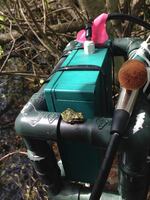
Danielle Nelson, a doctoral student at Oregon State University holds a Pacific chorus frog.
Courtesy of Danielle Nelson
Chances are you’ve heard the Pacific chorus frogs’ call before. Its classic “rib-bit” is featured in basically any movie that needs frog noise.
The Pacific chorus frogs’ call is ubiquitous in the Northwest. But the amphibians are having more and more trouble hearing themselves.
Traffic is drowning them out.
During mating season the chorus of “rib-bit” “rib-bit” “rib-bit” attracts the females to ponds where they mate.
“So if he’s got a nice, deep, sexy voice they’ll find him more attractive,” said Danielle Nelson, a doctoral student at Oregon State University. “If he calls more often, they’ll find him more attractive.”
Females can sort through up to eight frogs at once, when they’re looking for a partner.
Nelson found that Pacific chorus frogs don’t adjust their “rib-bits” to the noise level around them.
She collected sound from around the Willamette Valley — in William L. Finley National Wildlife Refuge, far from roads or even where the general public can go, to 100-feet away from Interstate 5. The louder the area, the smaller the range of the frogs’ call.
Nelson recorded the audio during the peak of mating season 4 p.m. to midnight from February to May, sometimes drenched and cold.
Listen to the call of a Pacific chorus frog
“I would be out there in my waders standing in the middle of this enormous frog chorus, looking up at the stars. It was just this magical moment of feeling very small while being surrounded by thousands of things that were much smaller than I was, making a much louder sound than me.”

Nelson set up recorders around the Willamette Valley — in William L. Finley National Wildlife Refuge to 100-feet away from I-5 — to collect sound of Pacific chorus frogs.
Courtesy of Danielle Nelson
Nelson said at first she couldn’t believe her findings — Pacific chorus frogs are ubiquitous in the Northwest and can adjust to so much of their habitat. They can breed in puddles or agricultural areas or in the middle of the city.
“I figured if any species of frog was going to be able to change how it called, it was going to be these guys,” Nelson said.
She thinks the implications of noise pollution on mating habits could not only affect Pacific chorus frogs, but also animals like migrating birds who use the ponds.
“We can learn a lot from listening to the habitat around us. If animals are able to communicate, they’re able to carry out the business of their everyday lives. And if they can’t communicate with one another, then that is completely disrupted,” Nelson said.
Nelson says the noise pollution could compound bigger problems amphibians face, like invasive species and habitat loss — and concrete walls or hedges could help keep things quieter.
